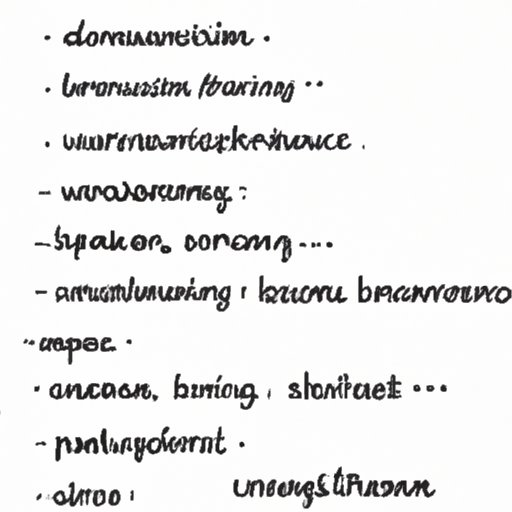Introduction
Formal writing is a style used for academic and professional writing. It typically uses more complex sentence structure and vocabulary than everyday speech. Since it is meant to be taken seriously, there are certain things that should be avoided in formal writing. This article will discuss what these things are and how to avoid them.
Avoid Using Slang or Colloquial Language
Slang and colloquial language are expressions that are not typically used in formal writing. Slang is words and phrases that are considered very informal and often change over time. Colloquial language, on the other hand, is more specific to a particular region or culture. Both types of language should be avoided in formal writing.
To avoid using slang or colloquial language, it is important to know the meaning of the words you are using. If you are unsure of the meaning or usage of a word, it is best to look it up in a dictionary or consult an expert. Also, avoid using any words or phrases that may be specific to a certain region or culture, as they may not be understood by everyone.
Refrain from Using Contractions
Contractions are shortened forms of words or phrases, such as “don’t” for “do not”. In formal writing, it is best to use the full form of the word or phrase instead of the contraction. This makes your writing sound more formal and clear.
When writing in a formal style, it is important to write out the entire word or phrase. For example, instead of writing “I’m”, you should write “I am”. Similarly, instead of writing “they’re”, you should write “they are”. This will make your writing sound more formal and clear.

Do Not Use Overly Informal Language
Informal language is language that is not typically used in formal writing. Examples of informal language include slang, colloquialisms, and jargon. When writing formally, it is important to avoid using any language that could be considered too informal. This includes any words or phrases that may be specific to a certain region or culture.
When writing in a formal style, it is important to use language that is clear and precise. To do this, try to use words that are appropriate for a professional or academic setting. Also, avoid using any language that could be seen as offensive or inappropriate.
Avoid Using Text-Message Shorthand
Text-message shorthand is a type of language used in text messages and other digital communication. It typically involves abbreviations, acronyms, and symbols. While this type of language may be acceptable in casual conversations, it should be avoided in formal writing.
To avoid using text-message shorthand in formal writing, it is important to use proper grammar and spelling. Try to use complete sentences and full words when writing. Also, avoid using any abbreviations, acronyms, or symbols that could be seen as unprofessional.

Do Not Use Unprofessional Language
Unprofessional language is any language that is not appropriate for a professional or academic setting. This includes any language that could be seen as offensive or inappropriate. When writing formally, it is important to avoid using any language that could be considered unprofessional.
To avoid using unprofessional language, it is important to use language that is appropriate for a professional or academic setting. Try to use language that is clear and precise. Also, avoid using any words or phrases that could be seen as offensive or inappropriate.
Avoid Using Too Many Adjectives and Adverbs
Adjectives and adverbs are words that can be used to modify or describe nouns and verbs. While these words can be useful in making your writing more descriptive, it is important to use them sparingly in formal writing. Using too many adjectives and adverbs can make your writing sound overly flowery or exaggerated.
When writing in a formal style, it is important to use adjectives and adverbs sparingly. Try to use simple language that is clear and concise. Also, avoid using any words that could be seen as unnecessary or exaggerated.

Refrain from Using Personal Pronouns
Personal pronouns are words used to refer to oneself, such as “I”, “me”, and “my”. In formal writing, it is best to avoid using personal pronouns. Instead, use third-person pronouns, such as “he”, “she”, and “they”. This makes your writing sound more objective and professional.
To avoid using personal pronouns in formal writing, it is important to use third-person pronouns instead. For example, instead of using “I think” or “I believe”, you should use “it is thought” or “it is believed”. This will make your writing sound more objective and professional.
Conclusion
In conclusion, there are certain things that should be avoided in formal writing. These include slang and colloquial language, contractions, overly informal language, text-message shorthand, unprofessional language, adjectives and adverbs, and personal pronouns. By avoiding these things, you can ensure that your writing is clear, professional, and appropriate for an academic or professional setting.
It is also important to remember that formal writing takes practice. The more you practice writing in a formal style, the better you will become at it. With practice, you can learn to write clearly and professionally in any situation.
(Note: Is this article not meeting your expectations? Do you have knowledge or insights to share? Unlock new opportunities and expand your reach by joining our authors team. Click Registration to join us and share your expertise with our readers.)
